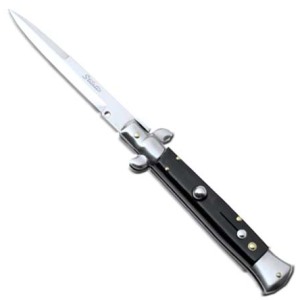 The Second Amendment of the Constitution guarantees the right to bear arms, including, but by no means limited to, guns. As the gun rights debate rages on, laws restricting the sale and possession of knives are rapidly becoming the “second right” in the battle to preserve Second Amendment rights. This issue has gained a lot more attention in recent years, most recently in Baltimore. Here, obscure knife laws have surfaced at the center of the Freddi Gray death case. Long before that case, however, the nonprofit advocacy group “Knife Rights” have been working on rolling back or repealing knife bans and restrictions.
The Second Amendment of the Constitution guarantees the right to bear arms, including, but by no means limited to, guns. As the gun rights debate rages on, laws restricting the sale and possession of knives are rapidly becoming the “second right” in the battle to preserve Second Amendment rights. This issue has gained a lot more attention in recent years, most recently in Baltimore. Here, obscure knife laws have surfaced at the center of the Freddi Gray death case. Long before that case, however, the nonprofit advocacy group “Knife Rights” have been working on rolling back or repealing knife bans and restrictions.
Knife Rights claims that possessing and carrying any kind of blade is a Constitutional right, much like with guns. So far, they’ve been using that argument to help 10 states slash most of, if not all, knife restrictions. In addition, the group has successfully advocated for “preemptive” laws in eight states, that block local jurisdictions from circumventing state law with their own, stricter regulations. However, not all repeals are the same; some leave laws against switchblades like stilettos on the books, although others are comprehensive, such as in Oklahoma and Maine. Knife Rights’ first major victory was in 2010, after it worked to get all switchblades, dirks and daggers legalized in New Hampshire. Currently, bills in several other states are pending.
People carry knives with them for numerous reasons, not always to maim or kill. In reality, according to Knife Rights, millions of Americans use and own knives for work or recreational purposes, although they can be used for protection. Large retail stores sell a variety of blades, although under existing laws, some of them could be deemed illegal. At the federal level, it’s still illegal to send or sell switchblades through the mail or across state lines, although there’s no restriction on individual possession. Each state has its own regulations, complicated through various definitions related to prohibited items and conceal/carry restrictions, and in numerous cases state laws can conflict with local ones.
In the case against the police officers involved in Freddie Gray’s arrest and death in Baltimore, the issue of knives has featured prominently. Police said that Gray was carrying a knife with him, which in Baltimore fits the definition of an “illegal switchblade”, although it doesn’t fit Maryland’s. If the police and prosecutors can’t agree on whether or not Gray’s knife was legal, then average citizens can’t be expected to know either, and could be subject to criminal penalties for guessing wrong.